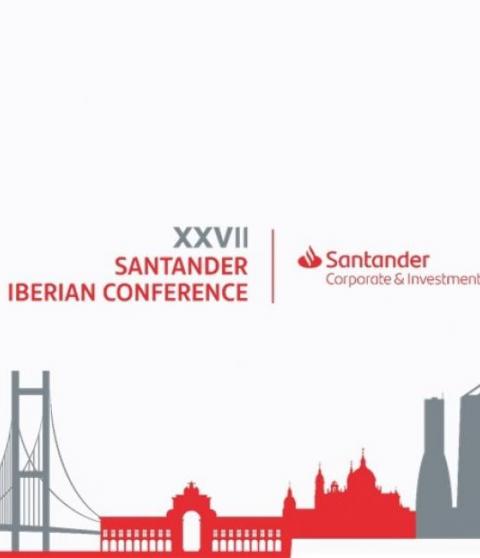XXVII Santander Iberian Conference: Creating a new future for the Iberian region
The start of 2021 has certainly been momentous for Santander with the launch of Santander’s XXV Latam Conference followed by the XXVII Santander Iberian Conference last week. Although every year the Iberian Conference provides us with key insights into the region’s economy and development, this year’s conference was particularly pressing considering the impact Covid-19 has had on the region.
Despite not being able to be held in-person, the conference still served as the key summit for Iberian issuers and main institutional investors in the region. Over the course of the conference, experts in the digital, ESG and tourism sectors discussed the economic outlook for 2021 and the path to recovery for the region.
The various panels featured top management representatives from leading companies and institutions in Iberia and the wider globe, including Ignacio Galán, Chairman and CEO of Iberdrola, Carme Artigas, Secretary of State for Digitalization and Artificial Intelligence in Spain, Werner Stengg, Member and Digital Policy Expert in the Cabinet of Executive, Pilar López, President & CEO at Microsoft Spain and Paul Misener, VP for Global Innovation Policy & Communications at Amazon.
While there has been much focus recently on the accelerated pace of digital transformation and the demand for more sustainable practices in light of Covid-19, an understanding of how these two factors can complement and drive each other was a key topic for discussion during the conference. Of course, both ESG and digital innovation lie at the heart of Santander CIB’s strategy, so it was extremely insightful to hear expert opinions on these topics from a range of sectors and perspectives.
An interesting view held by Werner Stengg, Member and Digital Policy Expert in the Cabinet of Executive, was that what digital transformation and the sustainable economy have in common is their focus on improved efficiency. Through digital innovation, governments and institutions can iron out inefficiencies by streamlining and optimising the processes necessary to achieving more sustainable practices, such as reaching carbon neutrality. In this sense, both the digital and sustainable transition go hand in hand.
Another important topic of discussion that many panel speakers were in agreement with was the shift in consumer behaviour during the pandemic, and the significant impact this will have on future investment decisions. The pandemic has pushed sustainability to the forefront, with customers increasingly making informed decisions about which companies to buy services from based on the business’s sustainability commitments. As certain businesses become more competitive in line with their ESG scores, retail demand will drive a revolution in institutional investment choices, where ESG investments are favoured over non-sustainable investments.
Moreover, the toll the pandemic has had on key industries in the Iberian region, particularly tourism, has forced companies and institutions to rapidly adapt their digital offering in order to retain customers. As companies and institutions increasingly cater to consumer demand for more streamlined and accessible digital services, AI and machine learning are only set to become increasingly embedded within business models.
In order for the Iberian region to leverage the digital and sustainable opportunities indirectly brought on by the pandemic, the conference showed that what will be vital is the nurturing of digital talent in the region. Carme Artigas, Secretary of State for Digitalization and Artificial Intelligence in Spain, insightfully showed us that currently Spain is investing more than 1 billion euros to bolster its 2025 digital strategy, with the aim of reducing the socio-economic, digital and gender gaps in the region. Through digital innovation, the plan will also aim to provide more unity between the various territories in Spain, in addition to ensuring 80% of the region’s population have digital skills, with 50% of those being women.
Utilising digital innovation in order to support more sustainable and efficient practices is a top priority for us at Santander CIB. We strongly believe that digital transformation and ESG depend on each other for their full fruition, and the conference has confirmed that finding a way to intersect the two is on top of the agenda for many other institutions and companies across the region. Now more than ever public and private investments need to coordinate efforts to financially bolster these initiatives, and at Santander CIB we are fully committed to fulfilling our duty to the region.
By leveraging digital talent within the region and meeting consumer demand for more sustainable practices, the Iberian region is set to build an economy capable of facing the challenges of tomorrow. Of course, much still remains to be done, and we hope that by next year’s conference we will be meeting in person to share some of the exciting advancements we have pledged to achieve today.
